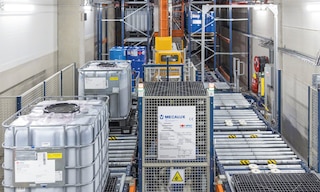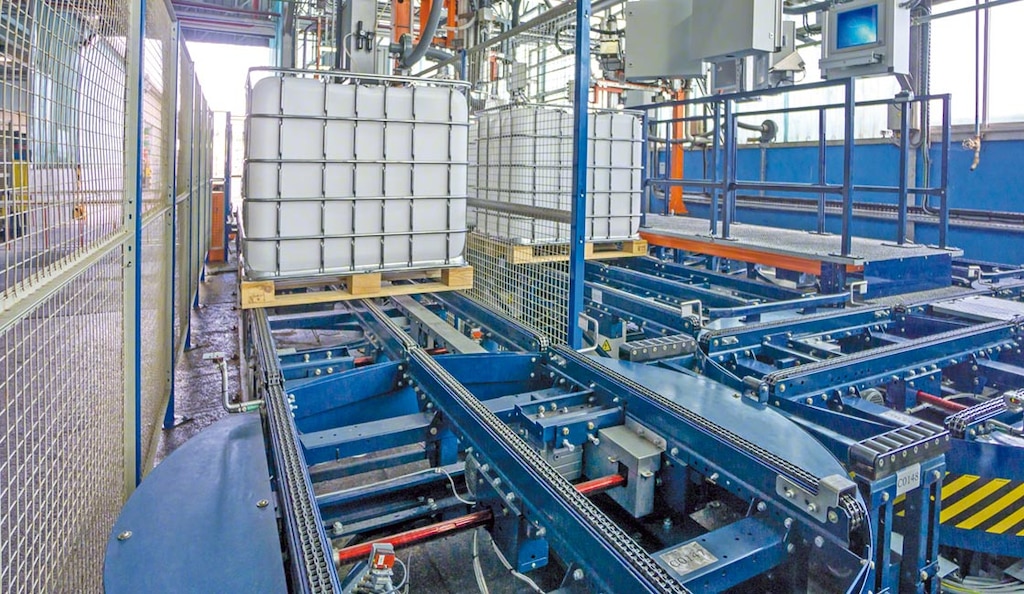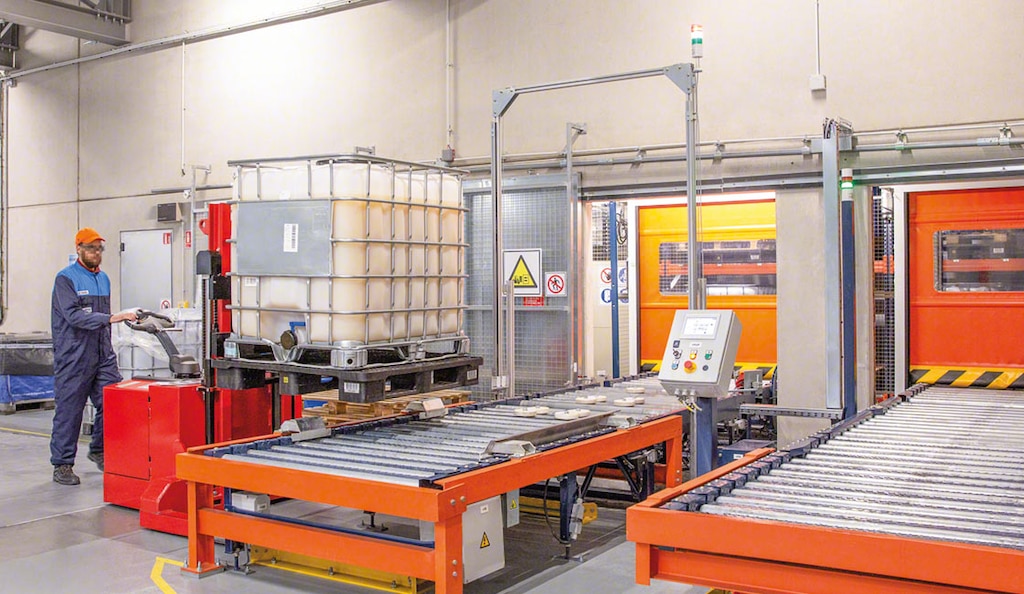
IBC totes: safe storage of liquids and bulk materials
IBC totes are a robust, efficient solution for storing and handling a wide variety of products in warehouses and production centers. Implementing good practices when using them optimizes operations in addition to fostering a safer, regulation-compliant working environment.
What is an IBC tote and what are its uses?
An intermediate bulk container (IBC) — commonly known as an IBC tote — is a recipient used to store and transport liquids, semi-solids, pastes, and granular solids. Other common names include IBC tank and pallet tank.
This type of unit load is an efficient, cost-effective solution for handling large quantities of bulk materials in the food and chemical industries. Although IBC totes can store up to 793 gallons, the most common capacities are 275 and 330 gallons.
IBC tote characteristics
Regardless of their volume, IBC totes stand out from other unit loads due to their characteristics:
- Material. IBC totes are typically made from durable materials such as high-density polyethylene, stainless steel, or a combination of both. Plastic IBC totes are often enclosed in a galvanized steel cage for added support.
- Design. They generally have a cubic or rectangular shape to maximize storage space and facilitate stacking. The tops of these containers usually have an opening for filling, while the bottoms incorporate a valve for easy emptying.
- Reusable and recyclable. A major benefit of IBC totes is that they can be cleaned and reused depending on the material they’re made from and the substances they’ve contained. Moreover, at the end of their useful life, they can be recycled.
- Versatility. IBC tanks are ideal for transporting and storing a wide variety of products, including chemicals, food, pharmaceuticals, cosmetics, paints, inks, and adhesives, to name a few.
- Regulations. IBCs are subject to specific regulations by country and based on the type of material they contain, especially in the case of hazardous substances.
Due to these characteristics, IBC totes are a vital tool in the chemical, agriculture, and food and beverage production industries, where they facilitate safe, efficient handling of bulk products.

Advantages of IBC totes in warehousing
IBC totes are an asset in many logistics facilities because of their various benefits:
- Space optimization. Given their modular design and cubic or rectangular shape, IBC totes can be stacked if their design and material allow for it. This helps maximize vertical space in warehouses.
- Flexibility. IBC totes are suitable for storing liquids, granular materials, and other substances, making them a versatile option for multiple industries and products.
- Ease of use. With features like valves for easy discharge and large openings for fast filling, IBC totes streamline intralogistics operations.
- Durability and safety. Designed from highly resistant materials, IBC tanks reduce the risk of damage during storage and transportation.
Companies using IBC totes
More and more businesses are storing their goods in IBC totes to make their logistics operations efficient. These are some of them:
Automated warehouse for cosmetics production
Cosmopak, a company dedicated to manufacturing and packaging cosmetics, installed a 486-foot-long automated warehouse in its logistics center in Ovar, Portugal. Connected to production, this versatile, customized facility manages over 2,500 SKUs in a single aisle. The automated storage and retrieval system (AS/RS) operates at ambient and refrigerated temperatures, storing pallets, big bags, and IBC totes.
Cosmopak stores the raw materials used to manufacture its cosmetics, gels, shampoos, and fragrances in IBC totes. Additionally, the AS/RS sends empty IBC totes to the washing area via the Easy WMS warehouse management system. These containers are subsequently filled with products made in the high-end cosmetics area.
Cosmopak closely tracks its IBC totes to comply with good practices for cosmetics manufacturing. This is because these containers have a long lifespan and are reused multiple times a year. Therefore, all movements — e.g., receipt, putaway, product emptying, cleaning, and refilling — must be recorded. The system then stores this data for up to four years.
IBC totes for automotive paint
Car manufacturer Nippon Paint also houses its merchandise in IBC totes. The company has opened a modern facility in Plessis-Pâté, France, strengthening its presence in Europe and centralizing its production and storage operations.
To ensure an annual output of 3,300 tons of paint, Nippon Paint has built an AS/RS consisting of a single 131-foot-long aisle with a storage capacity of 384 pallets. Raw materials are stored in drums and IBC totes. These are deposited on pallets and can hold up to 1.4 tons. Easy WMS strictly monitors the SKUs in stock as well as entries and exits of raw materials.

High-density storage of IBC totes for margarine production
Multinational food company Vandemoortele uses IBC totes to store margarine, oils, and cooking fats. It has implemented five systems in its warehouse in Barcelona, Spain: an automated rack-supported building, picking shelves, and pallet, push-back, and pallet flow racks.
The push-back racking holds drums and IBC totes on large pallets (47.2" x 47.2") with a maximum weight of 1.1 tons. This 21.3-foot-tall high-density system allows for storing two pallets deep per level. IBC totes are perfect for ensuring the safe storage of Vandemoortele’s goods while maintaining their quality and flavor.
Efficient storage of liquids and bulk products
IBC totes are an essential logistics solution for effectively handling liquids and bulk materials across numerous industries. Their ability to reduce transportation and storage costs — along with a design that facilitates both use and reuse — makes them indispensable in numerous warehouses.
Looking to streamline and optimize the storage of IBC totes? Be sure to contact us. At Interlake Mecalux, we can advise you on the warehousing solutions that best meet your company’s needs and boost logistics operations.
